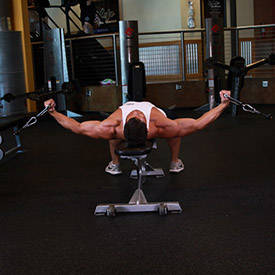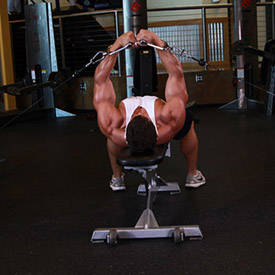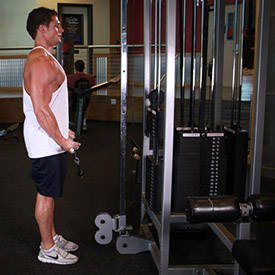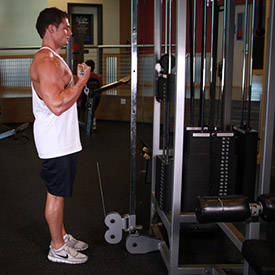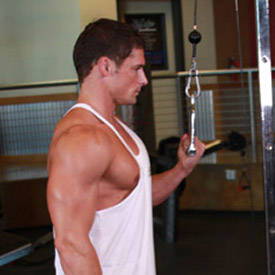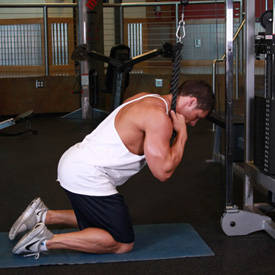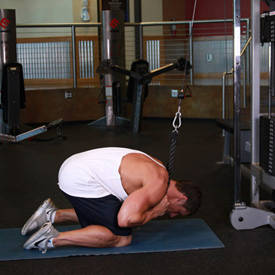In my many years as a health-and-wellness expert, I've come across a lot of fitness theories. Not many hold up to all the hype surrounding them.
Many people swear by free weights, and while it's important to use them as part of your program, cable exercises offer invaluable advantages.
For one, the key to healthy and lean muscle is getting a full range of motion from top to bottom, and cable exercises emphasize full, fluid, and controlled movement for complete muscle development.
Second, cable exercises place less stress and impact on the joints, ligaments, and tendons. This means you can perform the exercises smoothly, efficiently, and consistently-the perfect opportunity to really focus on the muscles and put the mind where the body is.
So it's time to rethink your weight training with 8 cable exercises guaranteed to rock your muscles' world.
Exercise 1: Time to Fly
It wasn't until I started integrating the cable fly back in 2002 that I began to get more definition and volume in my chest. It came from the stretch and contraction that cables emphasize. Cable flyes challenge the stabilizing muscles more than the dumbbell fly. The cable version also allows me to target my chest at various angles by adjusting my torso. I also experience a better contraction in the center of my chest, leading to greater definition and striations. The best part-a smooth transition from the minor to major pectoral muscle without having to drop 100-pound dumbbells.
Exercise 2: Complete Your Curl
How do you get that full bicep peak? The answer is a full range of motion from the very top to the very bottom of the curl movement using cables. For me, cable curls isolate a more fluid curling movement and focus on the muscles being used. To really get definition on the biceps, you have to remember that there are multiple parts make up the entire bicep muscle. With cable curls, simply rotating the wrist allows you to achieve a greater contraction and transition from biceps to biceps brachii, and then to the brachioradialis. Though you can rotate similarly with dumbbells, you lose the efficient and fluid movement that cables provide.
Exercise 3: The Total Triceps Extension
Here is where you can use cables to add muscle mass to the back of the arms. Triceps extensions can be done from many different positions using a rope, bent-bar, or straight-bar attachment, but the most important key to results is full range of movement and muscle control.
By doing cable triceps extensions, you not only get full range, but you can also shift the load to different areas of the triceps in a controlled, isolated manner. The cable triceps extension provides more continuous tension to the triceps than with a dumbbell. The result: more volume, definition, and striations in the triceps.
Exercise 4: Chopping Wood with Cables?
This is the real total body exercise, and it's where cables really show their added value. Cable wood chops allow the weight to remain consistent when performing the exercise and take away the jerkiness that can come when using a medicine ball or dumbbells. It also provides more comfort and greater range of motion than the dumbbell, which is very important for optimal results. Your vertebral column will thank you as well!
Exercise 5: Chest Press Performance
Cable chest press is a great alternative to the barbell bench press. The cable version gives you the reins to be in control and rotate the wrist in any direction, so you can recruit more muscle fibers and give the joints and rotator cuff some added strength and stability. The cable chest press stimulates good growth and definition in the chest and allows for an easy transition into other exercises.
Exercise 6: The Shoulder Press on a String
Because of a major shoulder injury, I was forced to start using cables for shoulder press. What I've found is that the cable shoulder press offers more control than free weights. The shoulder and all its corresponding muscles (anterior, medial, and posterior) can be very fragile if put in a compromised position, so being in control of the weight and the movement is crucial.
With a heavy barbell or dumbbells, you can lose control and can risk injury. The risk of injury is also amplified if you have to lift dumbbells from the floor to the starting position. The cable shoulder press allows you to work your delts through a deeper range of motion with minimal risk, increasing shoulder mobility and strength at the same time. The cable shoulder press also challenges the stabilizing muscles more than a barbell or dumbbells. This will strengthen and protect your shoulder joints.
Exercise 7: Kick Your Triceps into High Gear
I was one of those people who had to work their ass off to get good triceps. My Biceps weren't too hard. But triceps? The bane of my existence. But I found that cable kickbacks worked great for adding definition, once I got the volume. You have to remember that the triceps are just like other muscles-they need attacking from different angles. With cables, I was able to do that while maintaining proper form and focus and lifting heavy weight. Most people in the gym use dumbbells for this exercise, but they often lose form and fail to do one of the most important things while doing a triceps kickback—keeping their elbow up and getting full contraction.
Exercise 8: Rethinking the Crunch
I see so many people doing crunches on the decline bench or the floor, and not exploring the advantages of cable crunches. With cable crunches, you can do them on your knees, while standing, using the decline bench, or while lying on the floor. From your knees or a standing position, you will help take unnecessary stress off the neck and other areas of the body. This will mean consistent resistance, which will give the abs and core smooth and effective exercise. All in all, the cable crunch places more emphasis on the abs than a floor crunch, and allows you a greater range of motion for the best results.



